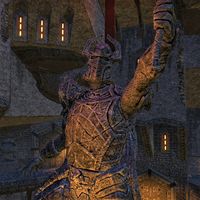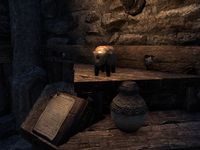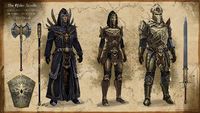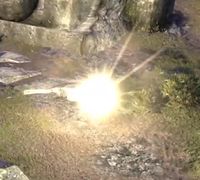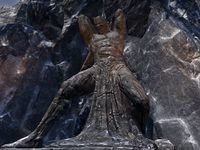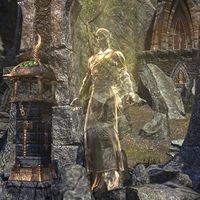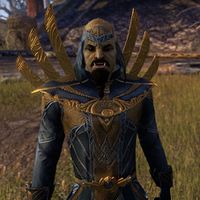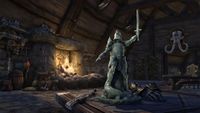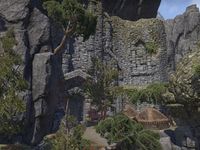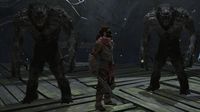Lore:Trinimac
—Forge-Mother Alga
Trinimac, the Warrior,[1] the Paragon,[2] and the Golden Champion,[3] was a prominent god of the early Aldmer; in some places, he was even more popular than Auri-El. He was considered "Auriel's greatest knight",[4] and he was a warrior spirit of the original elven tribes that led armies against mankind, and was known as the strongest of all the et'Ada who wandered Nirn. He is often depicted holding his sword Penitent, also known as Vosh Rakh, the "Blade of Courage". Boethiah is commonly believed to have "eaten" Trinimac and assumed his shape so the Daedric Prince could convince a throng of Aldmer to listen to him, which led to the creation of the Orcs and Chimer.[5][6][7] Afterwards, popular legend holds that Trinimac vanished from the mythic stage, only to return as Malacath, nothing more than a weak and vengeful version of his former glory.[5][8]
Certain legends paint Trinimac as a form other deities take. In the myth recounted in Shor Son of Shor, the deity Tsun takes on the form of Trinimac at certain points in the tale while the two remain, at least partly, distinct beings, noted as being "akin" to one another, at the same time.[UOL 1] Other sources attribute the identity of Trinimac as being Boethiah "as she had always been, the Warrior of East and West, and of the Starry Heart. She who bore the burden of rending divinity from the one she loved.", instead, with Malak King of Curses having taken on the identity of Trinimac through a curse and convinced the Ornim that they were elves, a veil Boethiah subsequently lifted from the eyes of those present.[9]
Contents
Worship and Culture[edit]
Altmer[edit]
As Aldmeri society evolved, commoners stopped worshipping their own ancestors and began worshipping the ancestors of their social "betters", elevating them to the level of gods through collective adulation. Trinimac was one such ancestor.[10] He is often referred to as the champion of Auri-El (even the champion of the entire pantheon).[7][11][4] He's found in the pantheon of several races of elves, including that of the Snow Elves.[12] An Aldmeri creation myth says Trinimac was on the front line during the et'Ada's conflict with Lorkhan, who they believe tricked their ancestors into creating Mundus. After Lorkhan's forces drove them from Atmora and sundered Old Ehlnofey, the legend says Trinimac knocked down Lorkhan in front of his army and ripped out his Heart "with more than hands", undoing the God of Mortals. But when Trinimac and Auri-El tried to destroy the Heart, the Heart just mocked them and said, "This Heart is the heart of the world, for one was made to satisfy the other", forcing them to hide it instead.[4]
The prayers of the Altmer often emphasize their believed ancestral connection with the Aedra, urging the faithful to give praise to the Divines and thus to their own ancestral lines, and describing the Altmer as always having the gods in their lives. It is said that the body of the divine wills the Altmer into being, and that they are one with the gods, their ancestors, and so should venerate them as one. The Altmer believe that the "Arm of Trinimac" bears arms against their enemies, shielding them in their darkest hour.[13][14]
Ayleid[edit]
Although Ayleids followed the Daedra, the Aedra of the Elven pantheon were still widely revered, with probably a majority of the Ayleids continuing to pay them homage, but cults devoted to the various Daedric Princes sprang up across Cyrodiil, tolerated and then celebrated.[15]
Orc[edit]
- "Trinimac is a warrior god who stands for unity and civilization. Before Malacath was, Trinimac is! Who needs blood and fury when a true god grants us courage and lifts us on high?" — Trinimac Priest
Trinimac is a god of major importance among the forward thinking progressive Orcs of Wrothgar. Orcish followers of Trinimac believe the deity did not get cursed into Daedric Prince Malacath as popular belief suggests, but instead Trinimac, alongside the other Aedra, gave his essence to the creation of Nirn, and that his influence can still be felt through Nirn.[16] Some of the Orcs who revered Trinimac and rejected believed that Malacath's traditions were stifling and had caused the Orcs to lose their way.[17] Others thought that the view many Orcs had of Malacath as their protector was false, as Malacath's real passion was vengeance, and so belief in him held the Orcs back.[18] Trinimac is known to have been a figure of worship in Orcish households of Orsinium during the kingdoms existence in the late First Era.[19] Some Orcs venerate Trinimac as their god-ancestor rather than Malacath. Orcs of the Trinimac cult insist that Trinimac fooled Boethiah into believing he was corrupted by his passage through Boethiah, when in fact he absorbed some of Boethiah's strength and passed it on to his followers and seeing themselves as the "improved Elves."[20]
In the Second Era, King Kurog reinstated the worship of Trinimac as the official religion of the Orsimer.[18] A cult led by Kurog's mother in secret attempted to force the conversion of the Orcs to the worship of Trinimac and to abandon the worship of Malacath. Once the plot was discovered that Kurog intended to kill all the Clan chiefs as part of his plan to force the strongholds to convert to the worship of Trinimac and work with him. The plot would be foiled by The Vestige, who ended up killing Kurog before he could slay all the clan chiefs.[21]
Around 3E 399, King Gortwog gro-Nagorm of Orsinium established a new priesthood devoted to the worship of Trinimac in order to espouse the understanding that Trinimac still lived, and that Malacath is an unrelated demon seeking to trick them. A minority of traditionalists within the territory, and the majority of Orcs without, viewed this as heresy.[22] While Gortwog's city would soon collapse after the Oblivion Crisis, this belief in Trinimac would live on well after The Great War with some heretical Orcs who still believe that Malacath is a liar and has somehow imprisoned Trinimac.[23]
Orc followers of Trinimac use Ebony as a material for their armors and weapons in token of Lorkhan's blood when Trinimac tore out his heart. They believe that Zylvara, the great eagle bore the Golden Champion to his reckoning with the man-demon Quarvish.[3] One of their sacred scriptures was known as the Book of the Warrior God, sometimes also referred to as Book of Trinimac.[24][25]
The Orcish Cult of Trinimac reveres a number of heroes associated with the deity.
The hero Avalian is believed to be "Trinimac's blessed child", who drove his blade into the heart of a "fiery god of lava and stone", traversing the landscape of the erupting volcano quick as the wind and with "such quickness that the heat did not scorch his feet".[25] Orcish priests of the Trinimac cult bestow his blessings to the faithful to increase their speed.[26][27]. The Vosh Rakh thought that, to accept the blessing of Avalian, was to embrace the guidance of Trinimac's swiftness become one with the wind.
Vaia is an Orcish hero thought to have broken the army shattering enchanted hammer of Rhogar the Destroyer, a deed accomplished under the watchful eye of Trinimac, using only a small wooden shield that remained intact even as surrounding trees were toppled from the force of the blow.[28] The Vosh Rakh thought that, to accept the defense boosting blessing of Vaia, was to be shielded from danger by Trinimac.[27][26]
Usunok is an Orcish hero known for charging into battle with only his fists and the blessing of Trinimac. It is said that, with Trinimac's blessing, Usunok could fell any foe, even a full sized mammoth, in a single blow, and that no amount of scales, fat, or muscle, could stop his fists.[29] The Vosh Rakh thought that, to accept the strength boosting blessing of Usunok, was to be granted the strength to overcome challenges by Trinimac.[27][26]
Some forms of Orcish magic can call down "fragments of Trinimac" to heal allies and damage enemies.[30]
Dunmer[edit]
To the Dunmer, it was Trinimac who preached that Lorkhan's idea for the mortal realm had been a trick all along and fomented war against Lorkhan and his followers, men. According to them, Trinimac believed that "tears were the best response to the Sundering", and encouraged hatred of Lorkhan for his actions.[6]
Origin Myths[edit]
Myths of Transformation into Malacath[edit]
Most of the legends of Trinimac are of his transformation and defeat. As the Altmer's chief protector, he fought enemies both without and within.[7] In the Late Middle Merethic Era (or the Dawn Era; sources differ),[7][31] after the Aldmer had settled the mainland of Tamriel,[32] Trinimac and his followers became engaged in trying to halt the Velothi dissident movement.[7][33]
Legends say that Boethiah was angered by the "lies" Trinimac was spreading about Lorkhan.[6] They call Boethiah the "Devourer of Trinimac",[34] for they say the Prince tricked Trinimac, consumed him, and then assumed his form.[5] Through dreams and visions, Boethiah convinced Veloth to build a new sect dedicated to the belief that mortals could ascend to become gods. Trinimac's priests condemned this "blasphemy", and when they were about to pass judgment, "Boethiah appeared, having swallowed Trinimac, and revealed the lies of Trinimac's teachings with Trinimac's own voice." After thoroughly shaming the priests, Boethiah relieved himself of Trinimac in front of the assembly.[33] According to legend, the dung Boethiah excreted became Malacath.[5] The followers of Boethiah and Trinimac rubbed this excrement on themselves to change their skins.[11] Altmeri propaganda portrayed this as a lesson on the dangers of Velothi influence,[5] while Velothi propaganda regarded Trinimac's transformation as punishment for attempting to interfere with their exodus. Malacath himself derided this tale as being too "literal-minded" (implying the essence of the story is somewhat accurate, albeit non literal).[35]
While most legends don't record how Trinimac was defeated, Orcish legend says that when Trinimac confronted Boethiah for the Velothi trespass and tried to fight, Mephala appeared and stabbed him in the back, bringing him to his knees while a gloating Boethiah cursed and twisted him.[36] After he was defeated and consumed, it is said Boethiah tortured his spirit in her belly. The Daedra Lord eventually grew bored and instead exiled Trinimac to a plane of choking ash. This torture and dishonor left Trinimac twisted and enraged. In a rage, Trinimac cut open his chest and "[tore] the shame from his spirit", being reborn as Malacath (also called Mauloch).[33]
In a version of the tale of Trinimac's defeat told to children in Cyrodiil, Trinimac, described as the greatest knight of the Ehlnofey and the champion of Akatosh, sought out Boethiah to chastise him for his misdeeds. The Daedric Prince knew he was coming and would first disguise himself as an old woman, who told Trinimac their younger brother knew where Boethiah was, and that she would tell him where he was if he scratched her back, covered in boils. Trinimac did so and then Boethiah would disguise as an old man, the old man told Trinimac his younger sister knew where Boethiah was, and would tell him if he washed his feet. Trinimac would wash the old man's disgusting feet, Boethiah would then take the form of a beautiful young woman. Trinimac dreaded meeting with the younger sister, but was relieved when he saw the beautiful woman, who said she would tell Trinimac where Boethiah was in exchange for a kiss. Trinimac gladly agreed only for Boethiah to open her mouth extremely wide as he leaned into kiss her. Boethiah would swallow Trinimac in a single gulp. Boethiah then took Trinimac's form, and made him make a fool of himself. Boethiah would then squeeze him out as a massive pile of dung, which would get up and slunk away in shame. The once great knight was transformed into the Prince Malacath, and all those who loved him were changed as well, becoming the Orcs. A disguised Malacath, when told of this account, derided the story as being too "literal-minded".[35]:Part 1, Prologue
It is commonly thought that those who agreed with Boethiah and followed the Velothi exodus became the Chimer, and Boethiah taught them many things, such as the "Tri-Angled Truth" and the rules of Psijic Endeavor.[6] Those who maintained allegiance to Trinimac, even as their lord festered inside Boethiah and his mind became bent on revenge, "changed to match" Trinimac and became the Orcs, a people cursed to exile.[7][33][37] They became outcasts, like their new god Malacath.[7] Though Malacath is treated as a separate entity, he seemed to inherit Trinimac's enemies. He is known as one of the Four Corners of the House of Troubles to the Dunmer, descendants of the Chimer,[8] and Malacath became legendary for terrorizing the domain of men.[7] Trinimac's teachings were forbidden in the Chimer's new homeland, modern-day Morrowind.[38]
Other Origin Myths[edit]
According to the myth recounted in From Exile to Exodus by Tarvyn Aram, during the Velothi exodus, the Velothi encountered the followers of Trinimac, who outnumbered them three to one. While Trinimac remained silent, his followers called the dissidents rebels, traitors, and filth. Boethiah then intervened, revealing the truth about the followers' identity as Ornim that had forgotten their days of iron and wood, sea and fire, and become convinced they were elves. Boethiah revealed that they had been deceived by the curses of a demon, who'd made it so that when they looked upon him they saw Boethiah herself. But it was Boethiah who'd brought them the Orichalc, who'd taught them the benefits of war, how to hold their blades, and how to reach beyond. Boethiah then gestured with her hands, forming a triangular sign that could only be true, and walked in a way that revealed the path to achieve an Exodus. Thus the curse was lifted from their eyes. Where they once saw Trinimac, Greatest of All Warriors, they now saw Malak, the King of Curses. And where they once saw Boethiah, Daughter of Blades, they now saw Trinimac, as she had always been. The Warrior of East and West and of the Starry Heart, who once bore the burden of separating divinity from her beloved. Enraged, Malak uttered an unknown curse and jumped into Boethiah's, into Trinimac's, throat, entering her very being and causing her to collapse in agony, retching blood and ichor. Thus Boethiah-Trinimac collapsed, seemingly lifeless and her followers despaired.[9]
However, Mephala and Azura intervened, for though Malak had forgotten, to contend with Boethiah was to contend with the Triangular Gate. The two cast their own spell that echoed the music of Dawn, aiding Boethiah in casting out Malak and his curse. Malak rose covered in Boethiah's blood and bile. Yet he now appeared different, not as the wretched Malak King of Curses, but as something more akin to the Trinimac his followers had loved. He now wore new armor and held a gleaming red axe, and his helm bore a tusked visage of the spurned and the opressed.[9] From beneath his new helm Malacath growled that Boethiah had forgotten what it meant to be an exile, and uttered a new terrible curse that had never been spoken. The sky split open with thunderous rain, the wind howled with a killing gale, and the very earth beneath them was sundered as fire and death rose from the pits. In the triangular field of divine chaos, Azura took a third of the followers and brought them to the star-wounded east, while Mephala took another third and took them to the southeast, for she alone did not fear the Hist.[9] Boethiah than tore out the last of her guilt under the sun and transported the third of the followers that remained to Oblivion. The land they had previously occupied drifted into the sea, but was not wholly destroyed, as it still had stories to tell.[9]
The followers found themselves in a deadened realm of smoke and ash. It was here that the worst of Malacath's fatal curse had been diverted by Boethiah. Malacath laughed that Boethiah had let him destroy her gift from the king that had been an idyllic paradise, but Boethiah responded her spheres were many and houses innumerable, and so she had no need of it.[9]
Malacath attacked once more, claiming he'd never stop hunting Boethiah. But, with a single precise strike, he was cleaved into the ashen wastes, his bones forming a new foundation. His blood mingled with the ash and soon the realm was his. Boethiah then spent time with the surviving followers, their skins changing under her teachings and the influence of the realm. When Malacath's spirit reappeared, Boethiah addressed him, urging him to stop trying to enforce his will through curses both he and his followers knew to be untrue, but instead to seek glory through struggle and to understand the Will Against Rule. In this way Malacath could come to learn the proper tendencies of the hero and know something of Love. She then formed a powerful sign with her hands, encapsulating Malacath and his followers into a singular sphere, casting it back onto the mountains of Nirn. Thus emerged the god Mauloch and the great Orcs, who would from than on build strength through adversity. Together, Boethiah and Mauloch tested and hardened their chosen peoples against one another, therefore guiding them further toward an Exodus.[9]
Daedric Commentary[edit]
The Mazken information broker of Fargrave, Madam Whim, has claimed that no living being can truly claim to understand how the Aedra and the Daedric Princes relate to one another, and that no information she's ever come across in her long life indicates stories of the Aedra to be more than stories. According to Whim, much like a "backwater village bully who falls in with a bandit gang", a Daedric Prince might go out of their way to avoid questions or quash rumors that claim they were once "an all-powerful Aedra". Whim finishes her comment by noting the "peculiar and particular cruelty" with which the written histories of Nirn treat the Orsimer, and asking, which is more likely, that an all-powerful Aedra found itself consumed by a Daedric Prince and recast in the mold of a pale shadow of itself, or that mortal scholars with a bias eagerly leapt on the metaphor that the Daedric Prince most associated with the Orc people was quite literally the excreted remains of a once-great god?[39]
Gallery[edit]
Notes[edit]
- In Sermon 8 of his Lessons, Vivec wrote that "Boethiah [...] wore the skin of Trinimac to cleanse the faults of Veloth", likely indicating that Trinimac and his followers were making it difficult for Veloth to convert people before Boethiah's intervention. Both there and in Sermon 10, Vivec made reference to the eating of Trinimac as an example of what he considered one of the particularly glorious "Walking Ways", or paths to achieving divinity.
- According to some sources the popular origin of Malacath due to the devouring of Trinimac is more of a traditional belief than anything else and, whatever his origin, there are none alive who could say what the truth is for certain.[UOL 2]
- The Charwich-Koniinge Letters, Volume 4 mentions there's a statue depicting the "Transformation of Trinimac" in Amiglith, a town in Summerset Isle.
- Father Of The Niben and other sources suggest that the Orc creation myth may be inaccurate, as Topal the Pilot encountered creatures he called "orcs" long before Trinimac's encounter with Boethiah.
- A xenophobic and bigoted High Elf once referred to Trinimac as the "shape-taker".[40]
See Also[edit]
- The Anticipations by Anonymous — Overview of the members of and the relationship between the Tribunal and the Daedra
- The Changed Ones — Story of how Boethiah refuted Trinimac
- The Fall of Trinimac by The Faithless One — An essay on the defeat and rebirth of Trinimac
- The Scroll of Avalian — An account of Avalian's battle with a fiery beast
- The Scroll of Usunok — An account of Usunok's hunt
- The Scroll of Vaia — An account of Vaia's battle with Rhogar the Destroyer
- The True Nature of Orcs — Book detailing the Orsimer race and their origin
- Ushenat's Notes by Ushenat — The notes of an adherent of Trinimac
- Varieties of Faith... by Brother Mikhael Karkuxor of the Imperial College — An expansive list of the pantheons and associated divine spirits of Tamriel's dominant cultures
- The Warrior's Blade — A short text on the god Trinimac
References[edit]
- ^ Forge-Mother Alga's dialogue in ESO
- ^ Statuette - Trinimac, Paragon
- ^ a b Crafting Motif 22: Trinimac Style — the Venerable Uugus, Priest of Trinimac
- ^ a b c The Monomyth
- ^ a b c d e Varieties of Faith... — Brother Mikhael Karkuxor of the Imperial College
- ^ a b c d The Changed Ones
- ^ a b c d e f g h The True Nature of Orcs
- ^ a b The House of Troubles
- ^ a b c d e f g From Exile to Exodus — Tarvyn Aram
- ^ Pocket Guide to the Empire, 3rd Edition: The Blessed Isle: Alinor and the Summersets — Imperial Geographical Society, 3E 432
- ^ a b The Anticipations — Anonymous
- ^ Gelebor's dialogue in Skyrim: Dawnguard
- ^ Praise Be
- ^ Mirnor of Auri-El's dialogue in ESO
- ^ Daedra Worship: The Ayleids — Phrastus of Elinhir
- ^ ESO Live - Episode 29, Wrothgar (56:30-57:49)
- ^ Forge-Mother Alga's dialogue in ESO
- ^ a b High Priestess Solgra's dialogue in ESO
- ^ Trinimac House Idol
- ^ Varieties of Faith: The Orcs — Brother Mikhael Karkuxor of the Imperial College
- ^ Events of Blood on a King's Hands in ESO
- ^ Pocket Guide to the Empire, 3rd Edition: Orsinium — Imperial Geographical Society, 3E 432
- ^ Villager Dialogue from Blades during The Heretic questline
- ^ Ordatha's dialogue in ESO
- ^ a b The Scroll of Avalian
- ^ a b c Elder Akarah's dialogue in ESO
- ^ a b c Events of The Anger of a King in ESO
- ^ The Scroll of Vaia
- ^ The Scroll of Usunok
- ^ Trinimac's Valor in ESO
- ^ Before the Ages of Man — Aicantar of Shimerene
- ^ Father Of The Niben — Florin Jaliil
- ^ a b c d The Fall of Trinimac — The Faithless One
- ^ Dialogue of Boethiah cultists in Skyrim
- ^ a b Lord of Souls — Greg Keyes
- ^ Mauloch, Orc-Father — Ramurbak gro-Abamath
- ^ Pocket Guide to the Empire, 3rd Edition: All the Eras of Man, A Comprehensive History of our History — Imperial Geographical Society, 3E 432
- ^ 36 Lessons of Vivec, Sermon 1 — Vivec
- ^ Malacath and Maelstrom
- ^ Inulale's dialogue in ESO
Note: The following references are considered to be unofficial sources. They are included to round off this article and may not be authoritative or conclusive.
| |||||||||||||||||
| |||||||||||
| |||||||||||||||||
| |||||||||||
